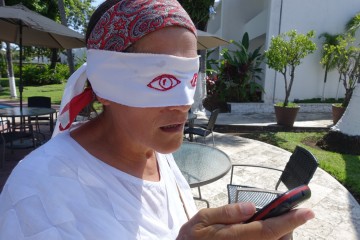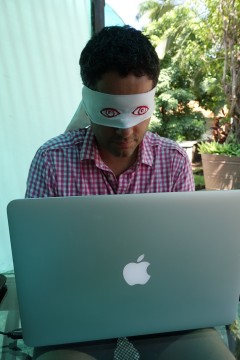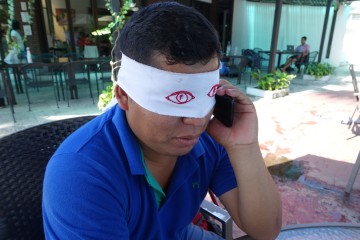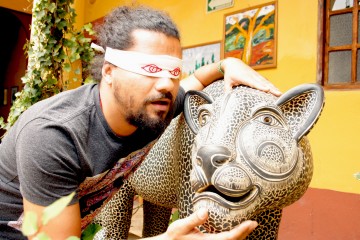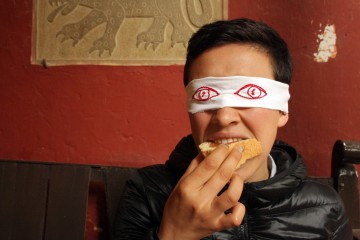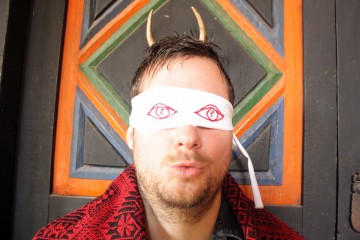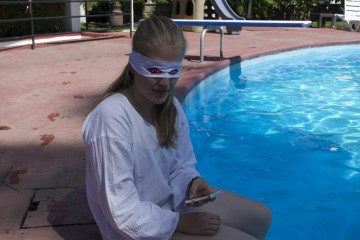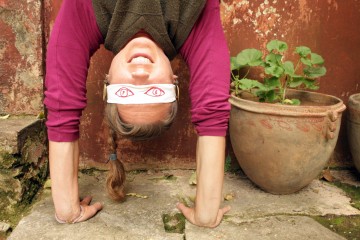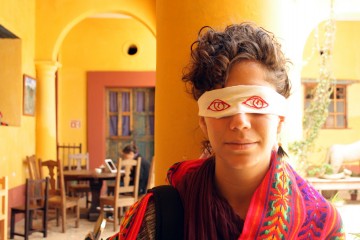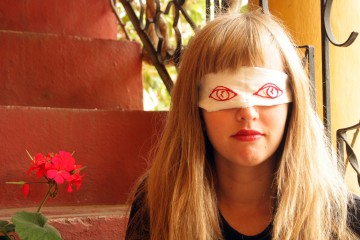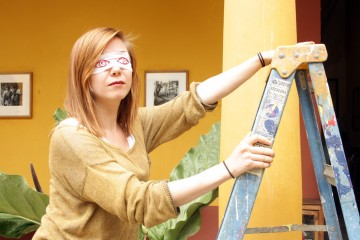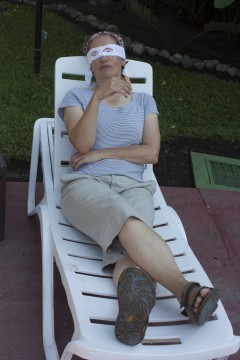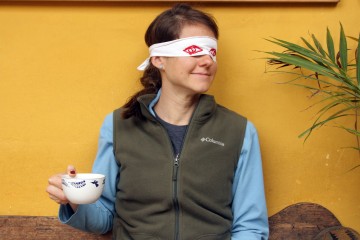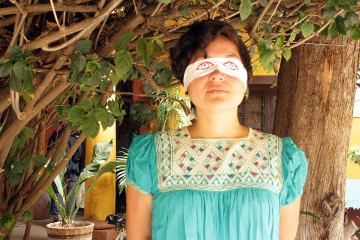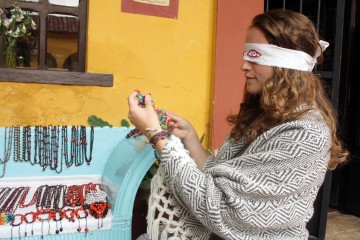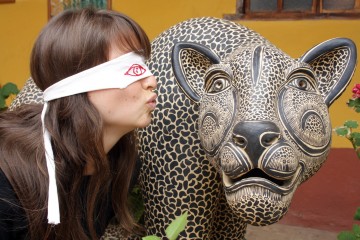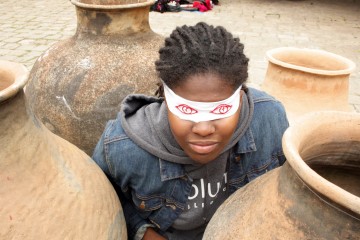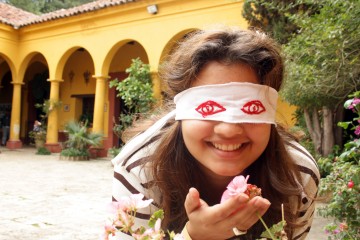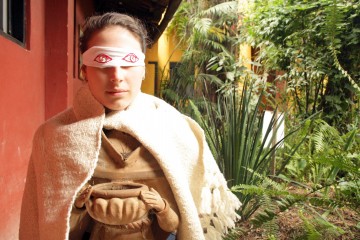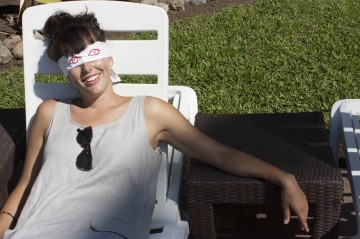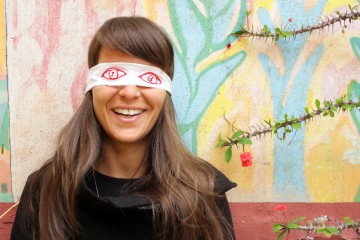Contributors
Faculty
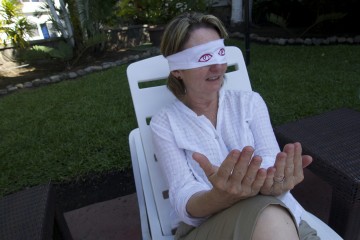 Diana Taylor is University Professor and Professor of Performance Studies and Spanish at NYU. She is the author of several books, including The Archive and the Repertoire: Performing Cultural Memory in the Americas (Duke University Press, 2003), and Performance (forthcoming Duke University Press, 2015). Diana Taylor is founding Director of the Hemispheric Institute of Performance and Politics.
Diana Taylor is University Professor and Professor of Performance Studies and Spanish at NYU. She is the author of several books, including The Archive and the Repertoire: Performing Cultural Memory in the Americas (Duke University Press, 2003), and Performance (forthcoming Duke University Press, 2015). Diana Taylor is founding Director of the Hemispheric Institute of Performance and Politics.
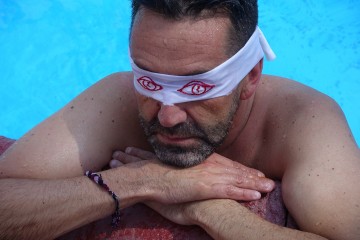 Marcial Godoy-Anativia is a sociocultural anthropologist and the Managing Director of the Hemispheric Institute of Performance and Politics at New York University. He is co-editor, with Zeynep Gambetti, of Rhetorics of Insecurity: Belonging and Violence in the Neoliberal Era (NYU Press, 2013). He is also Editor, with Jill Lane, of e-misférica, the Institute’s trilingual online journal. Marcial also serves on the Board of Directors of the North American Congress on Latin America (NACLA).
Marcial Godoy-Anativia is a sociocultural anthropologist and the Managing Director of the Hemispheric Institute of Performance and Politics at New York University. He is co-editor, with Zeynep Gambetti, of Rhetorics of Insecurity: Belonging and Violence in the Neoliberal Era (NYU Press, 2013). He is also Editor, with Jill Lane, of e-misférica, the Institute’s trilingual online journal. Marcial also serves on the Board of Directors of the North American Congress on Latin America (NACLA).
Performance Workshop Instructor
Jesusa Rodríguez is a theatrical creator whose work is characterized by its ironic humor and political satire. She has directed adaptations of diverse authors and artists, including William Shakespeare, Marguerite Yourcenar, Wolfgang Amadeus Mozart, and many Mexican authors. She also engages in activist work with indigenous and ecological groups, as well as those opposed to the Left. Her greatest achievement has been to accumulate discredit.
Photography Instructors
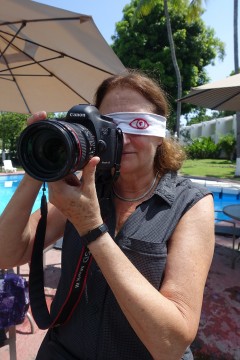 Susan Meiselas is a documentary photographer who lives and works in New York. She is the author of Carnival Strippers (1976), Nicaragua (1981), Kurdistan: In the Shadow of History (1997), Pandora´s Box (2001), and Encounters with the Dani (2003). She has co-edited two published collections: El Salvador, Work of 30 Photographers (1983) and Chile from Within (1990), rereleased as an e-book in 2013, and also co-directed two films: Living at Risk (1985) and Pictures from a Revolution (1991) with Richard P. Rogers and Alfred Guzzetti. Meiselas is well-known for her documentation of human rights issues in Latin America. Her photographs are included in American and international collections. In 1992, she was made a MacArthur Fellow and was recently awarded a Guggenheim Fellowship (2015).
Susan Meiselas is a documentary photographer who lives and works in New York. She is the author of Carnival Strippers (1976), Nicaragua (1981), Kurdistan: In the Shadow of History (1997), Pandora´s Box (2001), and Encounters with the Dani (2003). She has co-edited two published collections: El Salvador, Work of 30 Photographers (1983) and Chile from Within (1990), rereleased as an e-book in 2013, and also co-directed two films: Living at Risk (1985) and Pictures from a Revolution (1991) with Richard P. Rogers and Alfred Guzzetti. Meiselas is well-known for her documentation of human rights issues in Latin America. Her photographs are included in American and international collections. In 1992, she was made a MacArthur Fellow and was recently awarded a Guggenheim Fellowship (2015).
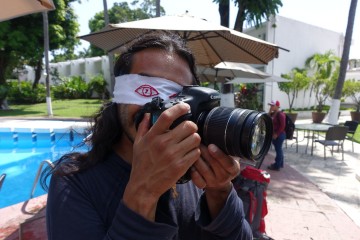 Moyses Zúñiga, a native of San Cristóbal de Las Casas, began his study of science and technology at the University of Xalapa in Veracruz in 1998, where he worked in television, photography and radio. In 2003, he began work in Xalapa at Diario AZ as a photojournalist and was subsequently hired by Milenio de Veracruz as the photography editor. He served as the correspondent for Mexican photography agency Cuartoscuro in 2006 during Subcomandante Marcos’ “Other Campaign” and travelled the entirety of Mexico with Marcos; during this time, Zúñiga also worked with the Associated Press (AP), Agencia EFE, and Agence France Presse (AFP). Since 2007, Zúñiga has worked with La Jornada in San Cristóbal de Las Casas and has covered the Chiapas region for the Associated Press and EFE. In 2009, he received a Rory Peck Training Fund grant for freelance journalists in high-risk areas from the Rory Peck Trust. Since 2013, Zúñiga has worked with a network of freelance journalists on reports about migration at the southern border of Mexico and has taught a workshop on photojournalism at the Intercultural University of Chiapas (UNICH). Zúñiga has exhibited his photography on three separate occasions at the Hemispheric Institute of Performance and Politics at NYU.
Moyses Zúñiga, a native of San Cristóbal de Las Casas, began his study of science and technology at the University of Xalapa in Veracruz in 1998, where he worked in television, photography and radio. In 2003, he began work in Xalapa at Diario AZ as a photojournalist and was subsequently hired by Milenio de Veracruz as the photography editor. He served as the correspondent for Mexican photography agency Cuartoscuro in 2006 during Subcomandante Marcos’ “Other Campaign” and travelled the entirety of Mexico with Marcos; during this time, Zúñiga also worked with the Associated Press (AP), Agencia EFE, and Agence France Presse (AFP). Since 2007, Zúñiga has worked with La Jornada in San Cristóbal de Las Casas and has covered the Chiapas region for the Associated Press and EFE. In 2009, he received a Rory Peck Training Fund grant for freelance journalists in high-risk areas from the Rory Peck Trust. Since 2013, Zúñiga has worked with a network of freelance journalists on reports about migration at the southern border of Mexico and has taught a workshop on photojournalism at the Intercultural University of Chiapas (UNICH). Zúñiga has exhibited his photography on three separate occasions at the Hemispheric Institute of Performance and Politics at NYU.
Digital Publishing Instructor
Marcos Steuernagel is an Arts and Humanities Postdoctoral Associate at New York University Abu Dhabi and holds a PhD from the department of Performance Studies at New York University. His work explores the ways in which the centrality of the body in contemporary Brazilian theatre and dance allows for a privileged understanding of the relationship between politics, aesthetics, and embodiment. Before joining NYUAD, Marcos was Adjunct Instructor in the Department of Drama at NYU and Program Coordinator for Digital Books at the Hemispheric Institute of Performance and Politics. He is co-editor with Diana Taylor of the digital books What is Performance Studies, and Resistant Strategies (forthcoming, Duke University Press).
Human Rights Activist
Ruben Figueroa is a human rights activist involved with the Mesoamerican Migrant Movement. His work involves traveling throughout Mexico and Central America, attempting to locate missing, displaced, and disappeared migrants both physically and digitally.
Teaching Assistants
Luis Rincón Alba is a PhD Candidate in the Department of Performance Studies at New York University. His academic research and artistic exploration focus on the ways carnivals, festivals, and theater throughout the Caribbean and Latin America form a complex network from which critical interventions and reinterpretations can be performed in order rethink the political economy of race, gender, class, and ethnicity within the current global context.
Olivia Gagnon is a PhD candidate in the department of Performance Studies at New York University. Her research explores the intersections of feminism, aesthetics, performance, and archival practice. She works at the Hemispheric Institute of Performance and Politics.
Pablo Domínguez Galbraith is a PhD Candidate in Spanish and Portuguese at Princeton University. He is currently writing his dissertation, “Forensic Aesthetics in Latin America,” which explores the social and cultural history of los desaparecidos in Latin America, the politics of care and mourning in Central America and Mexico in the last decade, and the intersection between forensic anthropology, social movements, and aesthetic practices. He recently collaborated with the Hemispheric Institute, co-organizing the conference “Crossing Mexico: Migration and Human Rights in the Age of Criminal Politics” with Diana Taylor, Marcial Godoy, and Alexandra Delano, and participating as a Graduate Assistant and co-organizer of “Art, Migration, and Human Rights.”
Students
Alina Peña-Iguarán graduated with honors from Universidad de las Américas in Puebla with a thesis on “The Representation of the Mexican Revolution in the Work of Elena Garro.” She obtained her PhD from Boston University, were she conducted further research on the Mexican Revolution with a dissertation on “The Auto-Representation of Intellectuals in the Narrative of José Vasconcelos, Martín Luis Guzmán and Nellie Campobello.” In 2011 she was awarded the “National Essay Award Nellie Campobello.” In 2012, Peña-Iguarán initiated new research on migration, culture, and biopolitics. She focuses on the problematic of borderization as a dispositive of subjectivity in cinema and literature. Currently she teaches Sociocultural Theory and Latin American Literature in the Department of Sociocultural Studies at the Western Institute of Technology and Higher Education at the graduate and undergraduate level.
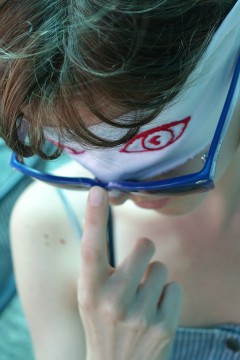 Denise Rogers Valenzuela was born and raised in Santiago, Chile. She has a BA in Arts and Humanities with an emphasis in theater and cultural anthropology from the Pontificia Universidad Católica de Chile. She recently finished her MA in Performance Studies from NYU. Denise has participated in various theater and performance art projects in Chile, Berlin, and New York, as a performer, researcher, and director. She is interested in performance as a means of activism and in exploring how to challenge oppressive gender constructs through performance of the quotidian and by creating and subverting rituals. Lately, she’s been working on a participatory menstrual art performance.
Denise Rogers Valenzuela was born and raised in Santiago, Chile. She has a BA in Arts and Humanities with an emphasis in theater and cultural anthropology from the Pontificia Universidad Católica de Chile. She recently finished her MA in Performance Studies from NYU. Denise has participated in various theater and performance art projects in Chile, Berlin, and New York, as a performer, researcher, and director. She is interested in performance as a means of activism and in exploring how to challenge oppressive gender constructs through performance of the quotidian and by creating and subverting rituals. Lately, she’s been working on a participatory menstrual art performance.
Diana Gluck is an undergraduate student at New York University Abu Dhabi. She is a double major in History and Visual Arts and is often mistaken for an Art History major. She is currently working on undergraduate capstone research projects in her two majors, both of which focus on labor and migration in the United Arab Emirates.
Emily Pryor is a Hispanic Studies PhD student at the University of California, Riverside. Her research focuses on Mexican indigenous cultural production in the forms of dance, performance art, film, theater, and literature. She writes on biocentrism, gender, and the subjectivity of the body as a site of resistance. She is a dancer of many styles and collaborated with Jack Gray, a Maori choreographer, dancer, and indigenous activist, to produce a solo piece performed at UCR titled, If I close my eyes.
Gabriela Bortolamedi is a New York-based filmmaker, anthropologist, and journalist. She hails from Puerto Rico, where she worked as a reporter with the Center for Investigative Journalism of Puerto Rico. She is currently a PhD student in Culture and Media at NYU, where her films and research focus on the daily lives of undocumented migrants in the United States. Ni Aquí, Ni Allá (2014), which premiered at the Margaret Mead Film Festival, is her first film.
Grace McLaughlin is an MA student in Performance Studies at NYU and an editorial assistant at the Hemispheric Institute for Performance and Politics. She began her work with both institutions after completing her undergraduate degree at NYU, where she majored in English and American Literature, minored in Gender and Sexuality Studies, and wrote a thesis on paratexts. Though her academic interests have been and remain wide-ranging, her current research focus is on performances of the law, with an eye towards US legal systems and performativity and the circulation of affect in oral arguments in particular.
Hannah Rackow is an MA student at York University in the Theatre and Performance Studies program. Originally from Montreal, her primary research interests include protest as performance, the performance of civil disobedience, guerrilla movements, and performance and politics in the Americas. Other interests include language and the politics of multilingualism in theater, solo performance and performance art, collective creation and forum theatre, borderlands and migration, student movements, feminism, and identity politics. Also a costumer and director, she has enjoyed working on one-act Canadian plays, as well as a number of Circus Burlesque productions.
Helene Vosters is a Postdoctoral Fellow with the Canadian Consortium for Performance and Politics in the Americas. An artist, activist, and scholar, Helene’s scholarly and performance work focuses on the role of public commemoration practices in constructing narratives related to militarism, nationalism, and violence. She has performed the embodied and durational activist memorial meditations Impact Afghanistan War, Unravel: A meditation on the warp and weft of militarism, and Haunting the Past’s Present: Falling for the forgotten (and not) dead of history throughout Canada, the United States, and Europe. Since 2014, Helene has been hosting public Flag of Tears: A lament for the stains of a nation embroidery circles in Canada, and while attending “Art, Migration, and Human Rights,” she launched Seeing/Unseeing Eyes.
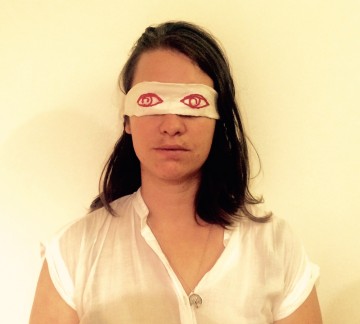 Isa Gil Everaert is a PhD student in Sociology at the CUNY Graduate Center in New York. She holds a Master’s in Arts in Humanities and Social Thought from NYU, which encouraged her to engage in interdisciplinary research. In broad terms, Isabel is interested in migration, both international and within national boundaries, gender, and urban sociology. Since 2012, she has conducted ethnographic work with undocumented youth in New York City. Recently, Isabel has started to investigate Mexico’s southern border and the migratory dynamics in countries of origin, transit, and destination.
Isa Gil Everaert is a PhD student in Sociology at the CUNY Graduate Center in New York. She holds a Master’s in Arts in Humanities and Social Thought from NYU, which encouraged her to engage in interdisciplinary research. In broad terms, Isabel is interested in migration, both international and within national boundaries, gender, and urban sociology. Since 2012, she has conducted ethnographic work with undocumented youth in New York City. Recently, Isabel has started to investigate Mexico’s southern border and the migratory dynamics in countries of origin, transit, and destination.
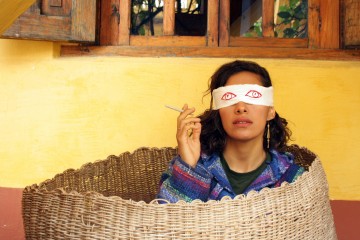 Janice Amaya is an actor, writer, and activist. She has lived and worked in New York and abroad for the past five years, focusing on the power of theater and its ability to heal in underserved communities. She is currently a double MFA candidate at Harvard University’s American Repertory Theater Institute and at the Moscow Art Theater in Moscow, Russia. In her final year, she will focus on creating Seen/Unseen, a theatrical production illuminating the history and human condition of Central American refugees who have been fleeing violence in their countries of origin since the late 1970s. She was born and raised in Texas, the middle child of Salvadoran parents.
Janice Amaya is an actor, writer, and activist. She has lived and worked in New York and abroad for the past five years, focusing on the power of theater and its ability to heal in underserved communities. She is currently a double MFA candidate at Harvard University’s American Repertory Theater Institute and at the Moscow Art Theater in Moscow, Russia. In her final year, she will focus on creating Seen/Unseen, a theatrical production illuminating the history and human condition of Central American refugees who have been fleeing violence in their countries of origin since the late 1970s. She was born and raised in Texas, the middle child of Salvadoran parents.
Lacey Schauwecker is a PhD Candidate in Comparative Literature at the University of Southern California. She is currently writing her dissertation, “Scream Circuits: Visualizing War across the Central American Diaspora,” which focuses on screaming as a recurrent aesthetic and alternative practice of witnessing within literature, film, photography, and performance art about the Central American diaspora. It addresses topics including civil war, transnational migration, narcotrafficking, and femicide. Lacey found this course to be an exceptionally inspiring academic experience and gives thanks to all those who were part of it.
Leslie Martinez is a new media artist pursuing an MS in Integrated Digital Media from NYU’s Polytechnic School of Engineering. Her research explores the intersections of racism, migration, and digital and analog technologies. Leslie is the daughter of Guatemalan immigrants. She currently works at the NYC Media Lab and Gotham Space Agency and lives in Queens, New York.
Mackenzie Sheldon, originally from greater Philadelphia, is a graduate of the University of Miami’s five-year Fellowship in Latin American Studies (FILAS). Through this dual BA-MA program, she was granted unique study, travel, research, and work opportunities in Miami, Philadelphia, and Latin America. Her primary academic influences come from the fields of comparative literature and film studies, critical theory, especially queer theory and critical geographies, memory and archival theory, and alternative historiographies. She currently works in Miami’s film industry and is a firm believer in the potential of cultural products to reshape the attitudes and practices of those who consume them.
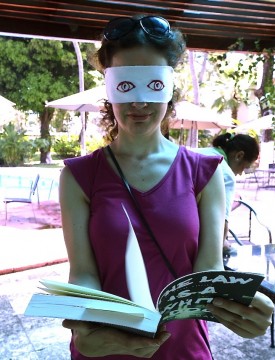 Maria Fernanda Vomero is a Brazilian journalist, artist, and human rights activist working in educational, cultural, and environmental fields. She has a Master’s in Creative Documentaries from Universitat Autònoma de Barcelona (UAB) in Spain and participates currently in the Pedagogy of Theatre promgram at Universidade de São Paulo (USP) in Brazil. Her research focuses on the relationship of theater, performance, and human rights among artistic groups in Palestine. She also works as a theater critic.
Maria Fernanda Vomero is a Brazilian journalist, artist, and human rights activist working in educational, cultural, and environmental fields. She has a Master’s in Creative Documentaries from Universitat Autònoma de Barcelona (UAB) in Spain and participates currently in the Pedagogy of Theatre promgram at Universidade de São Paulo (USP) in Brazil. Her research focuses on the relationship of theater, performance, and human rights among artistic groups in Palestine. She also works as a theater critic.
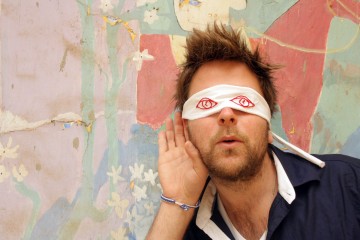 Max Kelly is currently completing his MA in Ethnomusicology at the University of Toronto. His research addresses the relationship between music and borders through internet sharing practices in the Americas. Max is also a musician and puppeteer working between Montreal and Toronto.
Max Kelly is currently completing his MA in Ethnomusicology at the University of Toronto. His research addresses the relationship between music and borders through internet sharing practices in the Americas. Max is also a musician and puppeteer working between Montreal and Toronto.
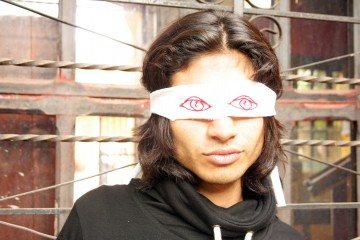 Nakaiyé Flotte is a doctoral student in the Department of Anthropology at Harvard University. Their research includes border security, queer migration, and engaged ethnography.
Nakaiyé Flotte is a doctoral student in the Department of Anthropology at Harvard University. Their research includes border security, queer migration, and engaged ethnography.
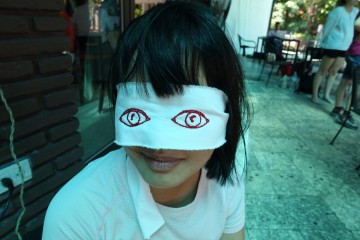 Nia Wilson is an undergraduate student at NYU in Abu Dhabi studying literature and theater with a sprinkling of social science for good measure. She is currently working on a project that explores gender and race in science-fiction iterations of the Pygmalion myth. After graduation, Nia plans to return to the United States to find a job, reconnect with family, and (finally) learn how to drive.
Nia Wilson is an undergraduate student at NYU in Abu Dhabi studying literature and theater with a sprinkling of social science for good measure. She is currently working on a project that explores gender and race in science-fiction iterations of the Pygmalion myth. After graduation, Nia plans to return to the United States to find a job, reconnect with family, and (finally) learn how to drive.
Paola Adarve Zuluaga was born and raised in Colombia. Her home country’s reality has motivated her interest in social justice issues, especially in relation to feminism and artistic practices. She has been involved in a wide range of activities, such as the active protection of minority groups, the critical analysis of sociocultural contexts, and research and activism projects regarding the construction of diverse forms of social justice through art. Her latest interest involves the impact of artistic practices and of artists themselves in contexts of violence, such as the Colombian armed conflict. She has a background in Anthropology (BA) and Languages and Sociocultural Studies (BA) and is currently finishing her MA in Gender, Race, Sexuality, and Social Justice at the University of British Columbia.
Rachel Russell is a dancer, dance educator, and MA candidate in Performance Studies at NYU’s Tisch School for the Arts. Rachel is interested in the liberation and healing of black women and all members of the African diaspora through understanding and bolstering world-making in dance and beyond. Rachel currently dances with two New York-based companies, Àṣẹ Dance Theatre Collective and Sydnie L. Mosley Dances. Additionally, Rachel has served as an arts administrator, production and choreographer’s assistant, research assistant, administrative intern, and workshop co-facilitator for choreographers such as Ni’Ja Whitson Adebanjo and organizations such as Urban Bush Women.
Rend Beiruti is an undergraduate student at NYU Abu Dhabi. She is an Arab Crossroads (Middle Eastern studies) and Theater double major. She is particularly interested in possibilities for political anarchism.
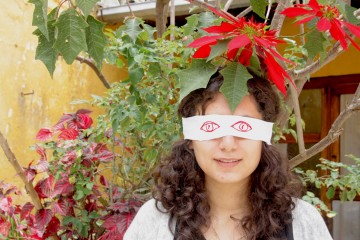 Rita Akroush is an undergraduate student at NYU Abu Dhabi. She is majoring in Theatre and minoring in Psychology and Film. She is interested in the healing elements of theater and art as a medium for political and social change. She hopes to pursue drama therapy after she finishes her undergraduate program.
Rita Akroush is an undergraduate student at NYU Abu Dhabi. She is majoring in Theatre and minoring in Psychology and Film. She is interested in the healing elements of theater and art as a medium for political and social change. She hopes to pursue drama therapy after she finishes her undergraduate program.
Salma Meddeb is a PhD candidate at the University of Montreal. Her PhD dissertation is a comparative project that investigates the representation and performativity of the female racialized body in minority theater. It analyzes discourses and practices that exclude and devalue immigrants, migrants, and members of visible minority groups and analyzes how performance condemns verbal and psychological violence and represents the racialized body in new and empowering ways, with a particular focus on dance and music. She may be contacted at salma.meddeb@umontreal.ca.
Sarah Paley is an MA candidate in Performance Studies at NYU’s Tisch School of the Arts, focusing on performance activism and performing identity through technology and media. Sarah recently graduated summa cum laude from Washington University in St. Louis, where she was the recipient of the John G. Jutkowitz research grant, as well as the Performing Arts Department’s Prize for Outstanding Artistic Creation. As part of her undergraduate honors thesis, Sarah staged various drafts of Samuel Beckett’s short work PLAY in order to assess performance variability amongst Beckett’s typescripts. In addition to her interest in archival productions, Sarah specializes in Boal’s Theater of the Oppressed and has spent the past two years teaching and researching Boal’s technique.
Tamara Skubovius (also known as Tsāma) is an interdisciplinary Tahltan artist who attended Kitinmaax School for Northwest Coast Native Art and later graduated with a BFA from Emily Carr University of Art and Design in Vancouver. Her praxis is founded on an indigenous perspective that weaves together cultural stereotypes to explore universal narratives, such as how the value of land and resources are created and assessed through neocolonial measures of worth and how cultural impact is assessed. Notable art projects are the Measure of Worth series, (un)natural selection and Tahltan Hats. Tamara is currently a student in the Interdisciplinary Master’s in Art, Media and Design program at OCAD University in Toronto. To see more of Tamara’s projects, please visit www.esln.ca.
Vanessa Vargas is a Venezuelan dancer and performer. She has an MFA in dance, an MA in Mass Media and Social Development, and a BA in Mass Communication. She is currently enrolled in the Performance Studies MA Program at the Tisch School of the Arts. In addition to working on her own dance projects, Vanessa is a teaching artist at Dancewave, where she gives a multilevel workshop that explores the body in movement as a celebration of life itself. Vanessa has performed at the Museum of Modern Art (MoMa) as part of several art shows, including Lygia Clark’s exhibition, James Lee Byars’ performance sessions, and Yoko Ono’s art show. For more information, visit her website: https://vanessavargasdancelab.com/
